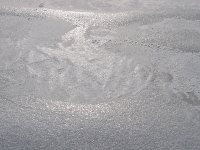
In the wake is in memory of the buried temple I came across on the Tamil coast. It is for us to give.

In the wake is in memory of the buried temple I came across on the Tamil coast. It is for us to give.

Shining Dunes of snow is another small photo set from the holidays.

Shadowed Snow is a small collection of photos taken this holiday in the woods of Cootes.

In the Fall we went to Ithaca and toured Cornell. I took my digital camera as I was beginning to think about learning and space. Today I finally got my pictures uploaded. They aren’t great, and the spaces are hard to parse, but it s a start, see Learning Spaces.
Matt Patey pointed me to a cheaper source of Theremin kits. See PAiA: Theremax theremin, the kit costs $79 USD + shipping. Now I need to come up with a reason why I need this for multimedia research.
The Diagnosis by Alan Lightman is one of the best novels about information and philosophy I have read. The hero, who works for a company that just processes information (without apparently contributing anything – just quantity), begins to go numb in a way reminiscent of Socrates after he swallows the hemlock. Woven into the novel are the e-mail exchanges of the hero with his son who is taking a course online and a Socratic dialogue. The book is a “diagnosis” of a culture that has confused quantity of information processed with wisdom. It is Plato’s story of writing in the Phaedrus in novel form.
For an interview with the author see, identity theory | the narrative thread – alan lightman.
Continue reading Lightman: The Diagnosis
The Society of the Spectacle, by Guy Debord, theorizes what McLuhan in The Mechanical Bride animated – the way our society is dominated by spectacle and representation. The media is the message, and viewing the screen is the paradigmatic spectacular activity. Computer games, I would add, are way our culture has adapted to the 60s critique of media and spectacle by the likes of McLuhan and Debord. Games have sold us on manipulation.
Continue reading Debord: The Society of Spectacle
At the TEI members meeting way back in October in Baltimore (see previous entry, TEI Members’ Meeting), Lou Burnard gave a great talk about where the TEI is going and the ODD format used to manage the TEI documentation. Lou can give a brilliant talk when he chooses to explain things carefully to lesser minds; that the talk followed an incomprehensible talk aimed at an “in” crowd (making me feel stupid since I should be “in” but obviously wasn’t) made it stand out even more. In it Lou explained where P5 (the next version of the Text Encoding Initiative) was going and talked about ODD (or One Document Does it all.) ODD is an XML resource for documentation of the TEI that is used both for creating the TEI Guidelines and is now to be used to actually create the custom version of the TEI DTD or schema for individual projects.
What is neat about ODD is that it is a form of “literate programming” where the source ODD document can be used to generate both documentation and code (DTD or schema.)
Continue reading ODD (One Document Does it all) Literary programming for TEI
The Liberty Alliance Project was set up to counter Microsoft’s Passport technology that threatened to put Microsoft at the centre of secure commerce and identiy technology for the net. Now that Passport is being declared dead (see InformationWeek), perhaps the alliance of equally commercial firms can get off the high horse of “liberty” and call themselves something less pretencious. Just how would technology for building identity for web transactions contribute to liberty?

My logs show that starting the 22nd of December you all stopped reading this blog. Good for you! Of course, now Christmas is over, so reading is picking up. Does this mean everyone is turning back on the computers and surfing now that presents have been bought, wrapped and opened?